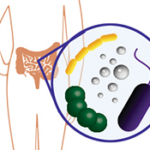Consumer Reports: Helping or Hurting Consumers?
October 2016.
By Mary Ellen Sanders, PhD, Executive Science Officer ISAPP –
In July, a well-respected source of unbiased product ratings, Consumer Reports (CR), published a damning article on dietary supplements.
The article begins with an account of a premature infant who died from intestinal mucormycosis believed to be caused by a mold contained in a probiotic supplement given to prevent necrotizing enterocolitis (NEC). (See here and here). NEC is a life-threatening disease most common in premature infants. CR spent over 500 words discussing this tragedy as a lead-in to make the point that dietary supplements are unsafe.
As a scientist, I question CR’s decision to focus on an example that says nothing about the inherent safety of the substance (a probiotic) being used as a supplement. This is a case about a product that appears to have been contaminated by a mold that was dangerous to a vulnerable, premature infant. It is not a case about probiotic safety. A peer-reviewed article published in the Journal of Pediatric Gastroenterology and Nutrition characterized this incident correctly: “The fatal adverse event affected a premature infant; it was accidental and related to the consumption of a contaminated dietary supplement” (Agostoni et al. 2016).
CR conflated the safety of substances used as dietary supplements and the potential safety risk of a contaminated product. Risks associated with contaminated products are not limited to dietary supplements. In this example, the contaminant likely posed no risk to a generally healthy person. But to a premature infant, this mold was deadly.
CR continues to tell about this ill-fated incident in a section titled “Unproven Treatments,” completely ignoring that probiotic use to prevent NEC is far from unproven. A recent Cochrane Collaboration review of the evidence for use of probiotics to prevent morbidity and mortality associated with NEC showed a 57% decrease in incidence of NEC and 35% decrease in death in premature infants given probiotics. The review concluded that available evidence strongly supports a change in medical practice to implement probiotics to prevent NEC, although they acknowledge that additional studies are important to assess the “most effective preparations, timing and length of therapy to be utilized” (AlFaleh and Ahabrees 2014).
Premature infants who develop NEC have an uncertain path ahead. Infants with NEC risk surgical removal of their colon or death (mortality ranges from 20-40%). Those who survive are at increased risk of neurodevelopmental disability and if surgical intervention was necessary, may develop short bowel syndrome. Clearly, prevention of this dangerous condition is the goal, and probiotics are useful to achieve this.
CR’s stated objective is to empower “consumers with the knowledge they need to make better and more informed choices” and to “advocate for truth and transparency.” Yet this article obfuscated the efficacy data on a treatment that could significantly prevent morbidity and mortality among premature infants. I expect this article will have a net negative impact on consumer health. Misguided readers and physicians discouraged or afraid to use probiotics to prevent NEC will lead to higher incidence of infant death and serious morbidity. Consumers interested in other probiotic benefits, such as management of symptoms of functional bowel disorders or prevention of antibiotic-associated diarrhea, may also be dissuaded from products with potential benefits.
There is clearly a need for dietary supplements used in at-risk populations to meet quality criteria necessary to reasonably assure safety. A probiotic targeted for premature infants may need more stringent microbiological standards (Sanders et al. Probiotic Use in At-Risk Populations. In Press. J. Amer Pharmacists Assoc.). CR should have made this point instead of trying to convince consumers that probiotics – which are among the best studied supplement ingredients for both efficacy and safety – are unsafe.
Related article: The Importance of Quality in Probiotic Products







